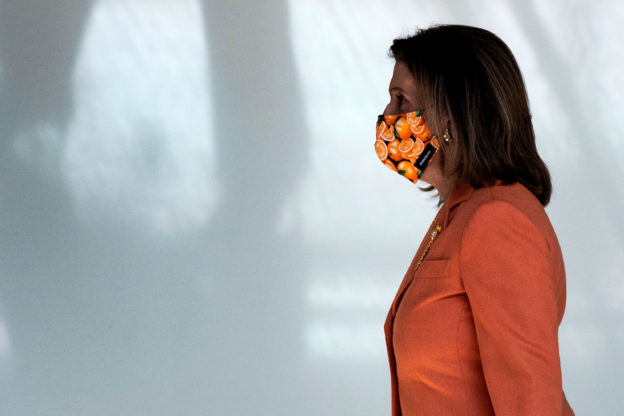Nancy Pelosi and Steven Mnuchin
Reuters
Democrats in the House and Republicans in the Senate expressed opposition to President Donald Trump’s $1.8 trillion coronavirus stimulus offer over the weekend, with White House negotiators now calling for a separate vote on small business loans until the deadlock on a broader package is broken.
The White House’s offer nearly doubles the original proposal from Republicans when talks began in late summer but is about $400 billion less than the $2.2 trillion bill Democrats previously passed, leaving party leaders in Congress on both sides unhappy.
“This proposal amounted to one step forward, two steps back,” House Speaker Nancy Pelosi said of the Trump administration’s stimulus offer in a letter to her members Saturday.
“When the President talks about wanting a bigger relief package, his proposal appears to mean that he wants more money at his discretion to grant or withhold, rather than agreeing on language prescribing how we honor our workers, crush the virus and put money in the pockets of workers,” Pelosi said.
Congress has failed to pass new aid for months as the virus continues to spread across the country and economic recovery slows.
The White House offer includes the following, according to NBC News:
- State and local governments — $300 billion
- Unemployment insurance — $400 per week, through the third week of January and retroactive to Sept. 12
- Liability protection for businesses
- Stimulus checks — $1,200 for adults, $1,000 per child
- Airlines — $20 billion
- PPP loans — $330 billion
- Minority lending — $10 billion
- Testing, tracing, vaccines, and health-care providers — $175 billion
- Education — $150 billion
- Student loan forgiveness — $25 billion
- Food assistance — $15 billion
- Child care — $25 billion
- Postal service — $10 billion
- Employee retention tax credit — $91 billion
- Lodging industry — $20 billion
- Broadband — $15 billion
Pelosi said the administration’s proposal lacks a strategic plan to contain the spread of the virus, and has inadequate funding for state and local governments as well as financial relief for American families.
Pelosi has called for a deal that reinstates the $600 per week supplemental unemployment benefit that ended in July and much more money for child care than what the administration is offering.
Senate Republicans also expressed opposition to the administration offer in a Saturday morning call with Treasury Secretary Steven Mnuchin and White House Chief of Staff Mark Meadows, sources told NBC News. They hated the package, one source said. Republicans don’t like the price tag and some of the policy areas. They took issue with what they described as Democrat demands to provide maximum health insurance subsidies to any new Obamacare enrollee as part of an agreement, one source said.
Mnuchin and Meadows in a letter to Congress on Sunday said that House Democrats haven’t compromised with Republicans on the bipartisan stimulus legislation. They called for a separate vote on Paycheck Protection Program funding, forgivable loans for small businesses.
“Now is the time for us to come together and immediately vote on a bill to allow us to spend the unused Paycheck Protection Program funds while we continue to work towards a comprehensive package,” they wrote. “The all-or-nothing approach is an unacceptable response to the American people.”
Pelosi wrote in a second letter Sunday that Trump’s failure to take the virus seriously “is reflected in the grossly inadequate response we finally received from the Administration on Saturday.” Pelosi called the White House proposal’s spending on virus testing, tracing and treatment “wholly insufficient” and said Democrats and Republicans remain at an impasse on stimulus legislation until the issues are resolved.
As election day approaches, it’s unclear if Congress will have time to produce a pandemic relief bill and push it through the Republican-held Senate, which is moving quickly to confirm Judge Amy Coney Barrett to the Supreme Court.
Senate Majority Leader Mitch McConnell said Friday that a stimulus package is “unlikely in the next three weeks.”
Larry Kudlow, Trump’s top economic advisor, said on Sunday morning that the president might go “beyond” the numbers that Democrats have called for in their stimulus proposal for certain “key targeted areas.”
Kudlow also said he thinks Senate Republicans who are opposed to the $1.8 trillion proposal from the White House will ultimately agree to a final deal
“I think if an agreement can be reached they will go along with it,” Kudlow said of the Senate GOP in an interview on CNN.
Kudlow also said he doesn’t think an economic recovery is dependent on another stimulus deal. However, Jerome Powell, the Federal Reserve chair, warned several days ago that “too little support would lead to a weak recovery, creating unnecessary hardship for households and businesses.”
Trump, who called off talks several days ago, now says he’s changed his position on approving more coronavirus aid before the November election, telling right-wing radio host Rush Limbaugh that “I would like to see a bigger stimulus package, frankly, than either the Democrats or Republicans are offering.”
However, White House communications director Alyssa Farah later told reporters that the administration wants a package that costs below $2 trillion, which would be less than the $2.2 trillion bill Democrats have proposed.
— CNBC’s Jacob Pramuk contributed to this report

Comments are closed